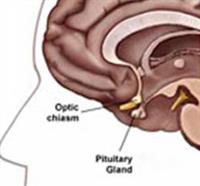Pituitary
About Pituitary Tumors
 Pituitary tumors are abnormal growths that develop in your pituitary gland. Some pituitary tumors cause excessive production of hormones that regulate important functions of your body. Other pituitary tumors can restrict normal functions of your pituitary gland, causing it to produce lower levels of hormones.
Pituitary tumors are abnormal growths that develop in your pituitary gland. Some pituitary tumors cause excessive production of hormones that regulate important functions of your body. Other pituitary tumors can restrict normal functions of your pituitary gland, causing it to produce lower levels of hormones.
Most pituitary tumors are noncancerous growths (adenomas). Adenomas remain confined to your pituitary gland or surrounding tissues and don't spread to other parts of your body.
If a tumor releases adrenocorticotropic hormone (ACTH), it causes increased cortisol which leads to fat deposits, especially in the shoulders and face. This is usually called Cushing's Disease.
Tumors that secrete excess prolactin are called prolactinomas. Excess prolactin can cause secretion of breast fluids in women and decreased sexual drive in men and women. Men may not experience breast fluid secretation but increased prolactin can certainly cause breast tenderness. It may also cause irregular or absent menstrual periods in women, and difficulty in having an erection or infertility in men. Typically these tumors can be treated with medication alone (bromocriptine).
For pituitary tumors that do not secrete hormones, the initial symptoms may not occur until the tumor presses on the structures surrounding the normal pituitary gland. Once the tumor is larger than 1 centimeter, it is called a macroadenoma.
 Because the pituitary gland is located within the skull, when it becomes large, it may cause headaches that get worse as the tumor grows. Also, since the pituitary gland is located near the eyes, it can press on the nerves to the eyes and cause loss of vision. Loss of peripheral vision may occur first and be undetected by the patient. This may progress to eventual blindness if the pressure is not removed from the nerve. The tumor may also press on the nerves that move the eye and cause double vision. If the tumor is very large it may press on other parts of the brain and cause problems with memory, weakness, or numbness. If surgery is warranted, the doctors at CU Neurosurgery usually perform a resection using a transnasal approach.
Because the pituitary gland is located within the skull, when it becomes large, it may cause headaches that get worse as the tumor grows. Also, since the pituitary gland is located near the eyes, it can press on the nerves to the eyes and cause loss of vision. Loss of peripheral vision may occur first and be undetected by the patient. This may progress to eventual blindness if the pressure is not removed from the nerve. The tumor may also press on the nerves that move the eye and cause double vision. If the tumor is very large it may press on other parts of the brain and cause problems with memory, weakness, or numbness. If surgery is warranted, the doctors at CU Neurosurgery usually perform a resection using a transnasal approach.
Some pituitary tumors may be observed without treatment because they may grow very slowly. Pituitary tumors are usually benign. It is rare for them to ever become malignant. If a decision is made to observe the tumor without treatment, ongoing evaluations by CT or MRI, by an endocrinologist, and by an ophthalmologist are usually done within 3-6 months after the initial diagnosis and every 6-12 months thereafter until the situation has been clarified. This period of observation without treatment provides information that helps the doctors decide whether other treatments that have more risks are needed.
Observation without treatment may also be recommended if conditions are present that would seriously increase the risk of surgical or other treatments. Because pituitary tumors are slow growing, patients can often be observed without treatment for long periods of time without the tumor causing serious problems. This is often the recommended form of treatment for patients who are age 70 or above or who have a serious medical illness such as heart disease. Close follow-up may be necessary to monitor tumor growth and symptoms.
Using our multi-disciplinary approach, CU neurosurgeons work closely with the Endocrinology team to manage these lesions.